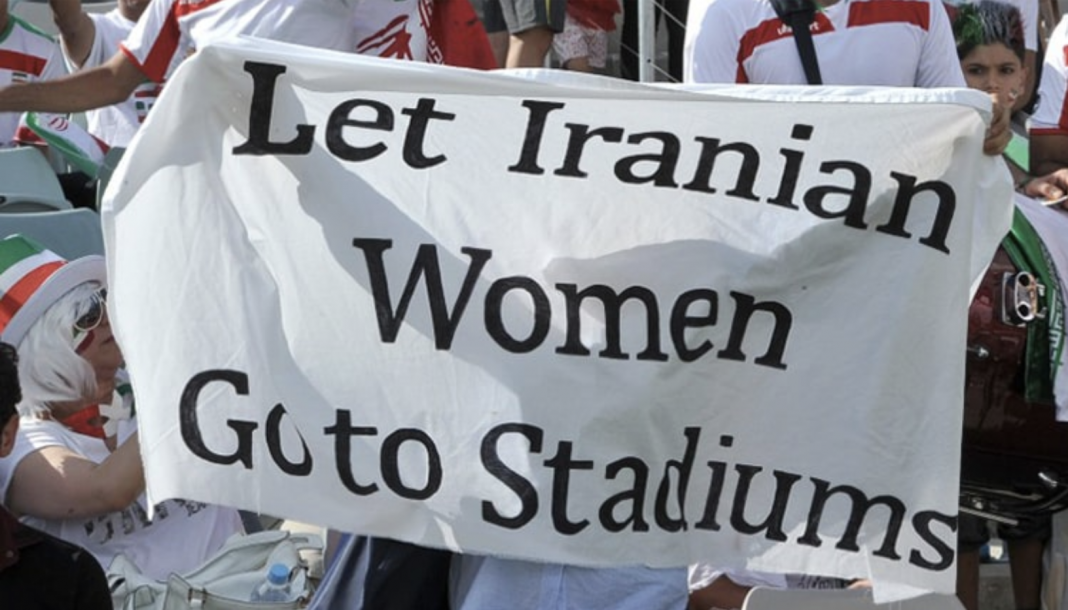

For many, the seats of a football stadium provide a refuge from the world. It’s where lovers of the game band together in one place to watch the beautiful game. There’s the emotional rollercoaster that often comes with the ebb and flow of a match. Still, ultimately it’s a place many of us call home.
That’s not the case for women in Iran.
Sahar Khodayari was a woman trying to watch her beloved Esteghlal. Instead of experiencing the joy of attending a match, she left in handcuffs, arrested. The reason? For being a woman.
The Blue Girl, as social media has taken to calling Sahar Khodayari, was freed on bail but sentenced to six months in jail on September 3. Sahar went on to set herself on fire outside court in Tehran and suffered 90 per cent burns. In hospital three days later, she passed away.
Iranian authorities kept the news about Sahar’s death quiet until September 9th.
To honour Sahar Khodayari is to fight harder for Iran to open its stadiums to women.
The fight has long been there, but now it’s catching increasing wind.
Sweden’s goalkeeper Hedvig Lindahl posted a photo on Instagram at dinner with the Iranian women’s team, telling FIFA it’s not ok what has happened to Sahar.
Sweden’s playmaker Kosovare Asllani joined her teammate, using her platform to shine a light on the tragedy.
I have a platform and I have never been afraid of raising my voice when in need.This is a tragedy and it can’t continue anymore. @FIFAcom it’s time to act and not be silent.WE need to help the women of Iran fight against gender apartheid.This is about human rights!#SaharKhodayari https://t.co/UE4r071Niv
— Kosovare Asllani (@KosovareAsllani) September 10, 2019
The men’s Iranian captain posted to Instagram about the sadness and loss of Sahar following the side’s first win in their 2023 World Cup qualification.
https://www.instagram.com/p/B2PUQ03HPq1/?utm_source=ig_web_copy_link
A statement from FIFA calls it a “tragedy” and wishes to “convey our condolences to the family and friends of Sahar and reiterate our calls on the Iranian authorities to ensure the freedom and safety of any women engaged in this legitimate fight to end the stadium ban for women in Iran”.
Human rights organisation, Amnesty International have also released a statement saying “her death must not be in vain. It must spur change in Iran if further tragedies are to be avoided in the future”.
Women have been banned from entering a stadium to watch a men’s sporting event since the early 1980’s in Iran. Whilst the ban is not written into law, “it is ruthlessly enforced” according to Human Rights Watch.
For last year’s World Cup, there was a temporary reprieve from the ban while matches were streamed in a stadium in Tehran. Despite FIFA setting a deadline of August 31 to allow women into stadiums. The deadline has now passed.
What can we do to help bring an end to the gender apartheid in Iran’s stadiums and avoid another tragedy like the death of Sahar Khodayari?
- Be informed. Learn about the history, along with what is going on right now.
- Keep talking about it. Tweet more, ‘Like’ and share more, write more to anyone who will listen.
- Follow and support organisations who are looking to create change. OpenStadiums is a movement of Iranian Women seeking to end discrimination and let women attend stadiums. Plus other more broad human rights organisations, including Amnesty International.
- Call on FIFA to ban Iran from competitions until the ban is lifted. Either get writing or go to the above points and show your support for groups who are advocating for change.
So while celebrations of record crowds across the world continue to ring out, and rightly so, let’s continue the fight to see Iran open their stadiums to women. We can’t forget Blue Girl, Sahar Khodayari.
This article first appeared on Molly’s Football Rants.






